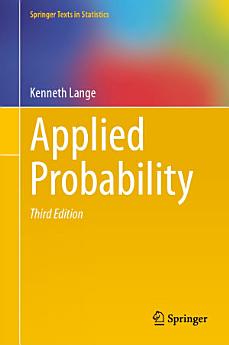Applied Probability: Edition 3
ກ່ຽວກັບປຶ້ມ e-book ນີ້
If supplemented with appropriate sections from Chapters 1 and 2, there is sufficient material for a traditional semester-long course in stochastic processes covering the basics of Poisson processes, Markov chains, branching processes, martingales, and diffusion processes. This third edition includes new topics and many worked exercises. The new chapter on entropy stresses Shannon entropy and its mathematical applications. New sections in existing chapters explain the Chinese restaurant problem, the infinite alleles model, saddlepoint approximations, and recurrence relations. The extensive list of new problems pursues topics such as random graph theory omitted in the previous editions. Computational probability receives even greater emphasis than earlier. Some of the solved problems are coding exercises, and Julia code is provided.
Mathematical scientists from a variety of backgrounds will find Applied Probability appealing as a reference. This updated edition can serve as a textbook for graduate students in applied mathematics, biostatistics, computational biology, computer science, physics, and statistics. Readers should have a working knowledge of multivariate calculus, linear algebra, ordinary differential equations, and elementary probability theory.
ກ່ຽວກັບຜູ້ຂຽນ
Kenneth Lange is the Rosenfeld Professor of Computational Genetics in the Departments of Computational Medicine, Human Genetics, and Statistics at the University of California, Los Angeles. He served as chair of the UCLA Department of Computational Medicine for 9 years and as chair of the UCLA Department of Human Genetics for 12 years. He has authored five other books, including Mathematical and Statistical Methods for Genetic Analysis (Springer, 2002), Numerical Analysis for Statisticians (Springer, 2010) and Optimization (Springer, 2013). In 2021 he was elected to the National Academy of Sciences.






